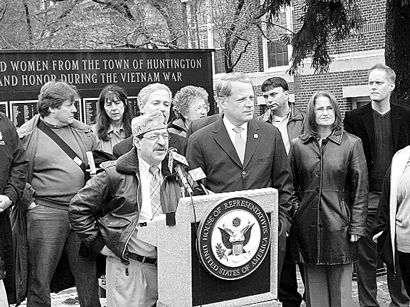Democratic Rep. Steve Israel says ban impedes military recruiting
A Long Island congressman who sits on the influential armed services committee, has joined a growing number of Democrats in the House of Representatives calling for the repeal of Don’t Ask, Don’t Tell, the military’s ban on gay and lesbian service members. On March 29, at a press conference in a district that encompasses parts of Suffolk and Nassau Counties, Rep. Steve Israel joined former gay and lesbian members of the military, including Denny Meyer, the president of the New York chapter of American Veterans for Equal Rights, a gay, lesbian, bisexual and transgender advocacy group, to urge Congress to overturn the ban in order to maintain the nation’s military readiness as it continues to wage combat abroad.
“We are at war in Iraq, we are fighting the global war on terror, but military retention and recruitment rates are suffering,” said Israel, underscoring the growing awareness on Capitol Hill that as the insurgency in Iraq continues and the Bush administration continues to commit forces to other combat theaters, such as Afghanistan, an already stretched military will face serious personnel shortages.
Meyer, a gay veteran, said that the ban erodes “unit cohesion” and in a later interview said that among the members of the military with whom he has spoken, including those who have served in the Iraq war, the preoccupation of completing a tour of duty safely figures more prominently than whether or not a unit has openly gay members.
On March 2, a coalition of 53 representatives, mostly Democrats, joined Israel in co-sponsoring a bill authored by Rep. Martin Meehan, a Massachusetts Democrat also on the armed services committee, the Military Readiness Enhancement Act, which calls for the repeal of Don’t Ask, Don’t Tell and the establishment of a policy of non-discrimination towards gays.
In a telephone interview after the Tuesday press conference, Israel referred to himself as a “pro-defense national security Democrat” and said he supports the use of “hard power and soft power to promote and protect democracy.”
Israel said that his support for repealing the ban is based on its inherent unfairness as well as the detrimental impact it has on recruitment and retention of qualified troops.
Israel said that while Secretary of Defense Donald Rumsfeld would likely not support a repeal on Don’t Ask, Don’t Ask, “other quarters” of the Pentagon support lifting the ban.
“The political climate is changing because recruitment and retention are so distressed right now,” said Israel, adding that even “hawkish Republicans must realize that.”
Since its inception during the first year of former Pres. Bill Clinton’s first term, Don’t Ask, Don’t Tell’s opponents have derided it as a license for the Pentagon to go on a witch-hunt against gays and lesbian service members, contrary to the stated intentions of the law’s drafters who compromised with Clinton in allowing gays and lesbians to remain in the military as long as they kept their sexual orientation confidential.
A recent report by the Government Accountability Office states that the ban has cost the government $200 million to enforce, resulting in the loss of nearly 10,000 soldiers, sailors and marines, some of whom, such as 300 highly trained linguists and translators, would have been able to fill critical shortage areas in the various missions that the military has initiated since the terrorist attacks of September 11.
Israel cited the GAO report and said that during a time of war, the “loss of the equivalent of two brigades” undermines the nation’s security. A typical infantry division, the Army and Marines core organizational unit, is comprised of 20,000 service members assigned to one of several brigades.
Israel said that Meehan’s legislation is the “principal vehicle for this issue” and that despite the bitter partisanship that characterizes debate on other controversial matters like the privatization of Social Security, there is a nascent sense in the House that the ban needs to be reconsidered. Because of the tradition of establishing political comity while American troops are in combat, there is some bipartisanship in the House. “Armed services is the least partisan committee in Congress,” Israel said.
Israel, who never served in the military, said that his district does not include any major military installations, but nevertheless is committed to keeping a strong military. He said reports from the Rand Institute and information from military experts are his sources of information on the state of the nation’s military readiness, before adding, “I don’t need studies, I don’t need analysis. It’s a matter of common sense.”
Since his arrival in the House in 2001, Israel has risen quickly within the Democratic ranks, becoming deputy minority whip in his second term. He has closed political ranks with conservative Republican colleagues on a range of issues that he considers cornerstones of his legislative expertise, like supporting the State of Israel and protecting the environment.
Recently, Israel joined Republican Rep. Timothy Johnson of Illinois in authoring an op-ed piece that ran in USA Today calling for “civil debate” in Congress rather than mudslinging.
The Human Rights Campaign, Capitol Hill’s gay lobby, gave Israel a score of 88 on its latest report card, for the lawmaker’s agreement with HRC’s positions on all but one piece of legislation, the Permanent Partner’s Immigration Act, introduced by a New York Democrat, Rep. Jerry Nadler, which aims to provide the foreign same-sex partners of U.S. residents the same immigration benefits as U.S. spouses. Republicans never let the bill emerge from committee
The congressman’s ability to cement ties with his colleagues might play an important role in any upcoming debates on repealing the military’s gay ban. As a member of the Blue Dog Caucus, a group of 38 centrist and fiscally conservative Democrats who represent mostly Southern and Midwestern districts, Israel has access to the moderate and right-leaning members whose votes will ultimately matter the most if Congress considers allowing gay and lesbians to serve openly in the military.
gaycitynews.com



































